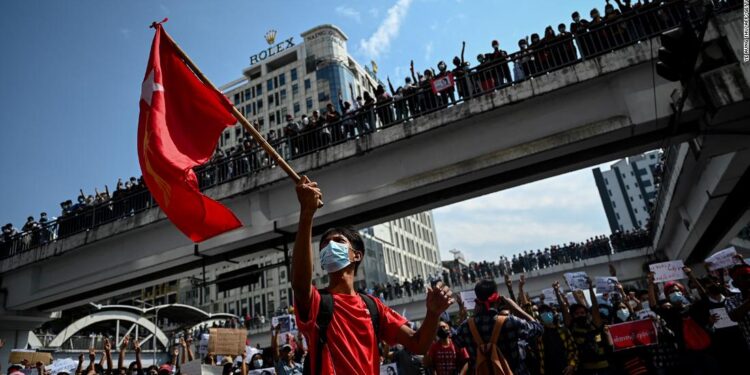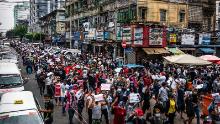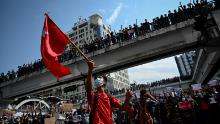Crédito: fuente
In a statement on the government-run MRTV channel, the military warned that «democracy can be destroyed» without discipline, and that people who «harm the state’s stability, public safety and the rule of law» could face legal action.
Notices have been issued to several townships in Mandalay imposing a curfew from 8 p.m. until 5 a.m., according to official notices posted to social media and translated by CNN.
Public gatherings of more the five people, joining marches on foot or in a car, and public speeches have been prohibited in parts of the city, the notice said, citing that people are at risk of causing a riot by carrying out «worrisome behaviors that could affect the public peace and rule of law.»
Those arrested could face prosecution under Section 144 of the Criminal Code for «unlawful assembly.» Section 144 has been used in the past as a way to stop lawful protests and to justify violent crackdowns on mass demonstrations.
Riot police used water cannon against protesters who had assembled near a barricade on a main road in the capital. The demonstrators could be heard chanting «people’s police.» Police warned on loudspeakers that force could be used if the protesters did not leave the area.
It was the second day that police had used water cannon against protesters in Naypyidaw. On Monday, protesters chanted anti-coup slogans and demanded power be handed back to elected leaders. Demonstrators dispersed after police told them they would fire live ammunition if they crossed a police line on one of the city’s main roads.
On live feeds posted on social media, protesters could be heard shouting «the people stand together against the dictator’s government» and held banners with portraits of Suu Kyi’s face.
Members of the Student Union led the first wave of protesters, with teachers and engineers joining the Yangon crowd. Saffron-clad monks could be seen supporting the crowd standing outside temples, raising the three-finger salute, and waving.
«We are not going to allow this military dictatorship to pass on to our next generation. We will continue our protest until this dictatorship fails,» Yangon resident Soe Maung Maung said.
The US State Department said that it was «very concerned» about military-imposed restrictions on public gatherings and offered support for the country’s peaceful protests.
«We stand with the people who support their right to assemble peacefully, including to protest peacefully in support of the democratically elected governments, and the right to freedom of expression, including the freedom to seek to receive to impart information both online and offline,» said spokesman Ned Price.
In his first public televised address since seizing power, Gen. Min Aung Hlaing on Monday told citizens to prioritize «facts» not «feelings,» pledged to hold «free and fair» elections and hand over power to the winner.
He did not say when elections would be held but repeated claims the November 2020 poll — in which Suu Kyi’s National League for Democracy Party (NLD) won an overwhelming victory — was fraudulent. The state of emergency, imposed when Min Aung Hlaing seized power, is in place for one year.
The election commission has denied the claims, saying any irregularities would not have been enough to change the overall result.
In his address, Min Aung Hlaing said that a new election commission had been formed and it is inspecting the voting lists.
Analysts have said the military’s justification of its takeover does not stand up because the seizure of power was illegal, and in doing so the military violated its own constitution that it drafted in 2008.
«The military claims that its actions are according to the constitution. But this is a coup and the military have bent the rules to suit their interests. It is hard now for anyone to take the military-drafted 2008 constitution seriously,» said Melissa Crouch, law professor at University of New South Wales, Australia and author of «The Constitution of Myanmar.»
Civilian leader Suu Kyi has been held incommunicado since she was detained hours before the military took control. She is under house arrest, charged with breaching the import-export law, while ousted President Win Myint is accused of violating the natural disaster management law — charges that have been described as «trumped up.»
Myanmar human rights organization, Assistance Association for Political Prisoners (AAPP) has documented at least 133 government officials and legislators, and 14 activists detained since the coup.
«There is reasonable concern that the military junta will transform these peaceful demonstrations into a riot and take advantage of the instability,» AAPP joint-secretary Bo Kyo said.
«Whenever state institutions are unstable it is the most marginalized sections of society who suffer, the military has form in finding blame in someone or other group. This must not be allowed to happen. The peaceful march towards democracy must succeed.»
CNN’s Pauline Lockwood, Radina Gigova and Richard Roth contributed reporting.










